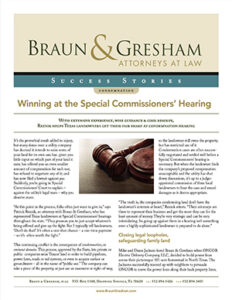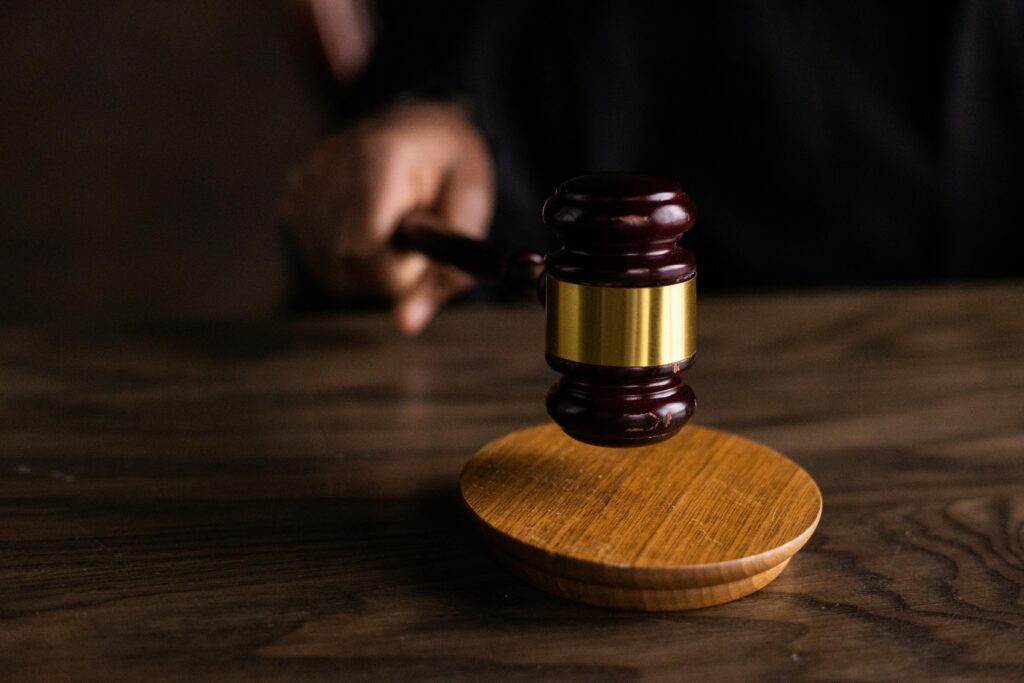With extensive experience, wise guidance & cool resolve, Reznik helps Texas landowners get their fair share at condemnation hearing
It’s the proverbial insult added to injury, but many times over: a utility company has decreed it intends to seize some of your land for its own use; has given you little input on which part of your land it uses; has offered you an even smaller amount of compensation for such use; has refused to negotiate any of it; and has now filed a lawsuit against you. Suddenly, you’re going to Special Commissioners’ Court to explain – against the utility’s legal team – why you deserve more.
“At this point in the process, folks often just want to give in,” says Patrick Reznik, an attorney with Braun & Gresham, who has represented Texas landowners at Special Commissioners’ hearings throughout the state. “They pressure you to just accept whatever’s being offered and give up the fight. But I typically tell landowners, ‘Don’t do that!’ It’s often a one-shot chance – a one-time payment – so it’s often worth the fight.”
This continuing conflict is the consequence of condemnation, or eminent domain. This process, approved by the State, lets private or public companies seize Texans’ land in order to build pipelines, power lines, roads or rail systems, or even to acquire surface or groundwater – all in the name of “public use.” The company can take a piece of the property, or just use an easement or right-of-way, so the landowner still owns the property, but has restricted use of it. Condemnation cases are often success- fully negotiated and settled well before a Special Commissioners’ hearing is necessary. But when the landowner finds the company’s proposed compensation unacceptable and the utility has shut down discussions, it’s up to a judge- appointed commission of three local landowners to hear the case and award damages as it deems appropriate.
“The truth is, the companies condemning land don’t have the landowner’s interests at heart,” Reznik attests. “Their attorneys are there to represent their business and get the most they can for the least amount of money. They’re very strategic and can be very intimidating. So going up against them in a hearing isn’t something even a highly sophisticated landowner is prepared to do alone.”
Closing legal loopholes, safeguarding family land
Mike and Diane Jackson hired Braun & Gresham when ONCOR Electric Delivery Company, LLC, decided to build power lines across their picturesque 101-acre homestead in North Texas. The Jacksons successfully teamed up with neighbors to persuade ONCOR to move the power lines along their back property lines, but the company was offering ridiculously insufficient damages based upon a legal technicality.
“Mike had owned 60 acres and the house himself, then he and Diane married, and later, they bought an adjoining 51-acre tract,” explains Reznik. “So ONCOR was claiming the two pieces of land should be considered separately owned, and since the lines would be located on only the tract adjoining their home, there were no damages to the original property and their home – even though it’s all one contiguous piece of land and the power lines would be in direct sightline of the house.”
Reznik foiled the utility’s scheme by deeding the house and original property from Mike alone to both he and Diane prior to the hearing. He also secured a skilled appraiser, who presented data supporting damages based upon the value of the couple’s whole property and two-story house.
“ONCOR’s initial offer was absurd,” scoffs Diane. “Patrick gave us a realistic amount we could aim for, we got very close to that, and we’re happy with it – as happy as you can be going through all that.”
“Patrick and his assistant made an awful process much easier,” she continues. “We were in way over our heads, and they were phenomenal – very accessible, very responsive. They knew what they were doing, and we always knew they had our best interests at heart.”
Gearldyne Gill had a similar – and similarly unpleasant – experience with ONCOR. Gearldyne’s 220-acre North Texas ranchland, in her family for almost a century, is currently used for raising cattle and coastal hay – but that didn’t mean she wanted power lines bisecting the property.
“At 86, my mother’s main concern was preserving the land for future generations,” says Gearldyne’s daughter Marcia Miller. “Those power lines would have made it impossible to build and would have seriously limited our use of it in the future.”
Gill and Miller researched attorneys and selected Braun & Gresham over other referred local attorneys. Reznik identified a qualified appraiser, walked the property, talked with the family, and tried to negotiate with ONCOR – twice. Nevertheless, the case went to hearing.
“I didn’t want my mother to have to deal with all that,” Miller says. “But Patrick was really good with her and all of us; we were proud to have him representing us. He made his points very professionally – calmly, but firmly. And he got the power line moved along our fence line, so it’s doing a lot less damage to the property. Overall, we were pleased.”
Making it better, doing what’s right
“Bottom line? None of it is fair,” concedes Reznik. “It’s about gleaning the best you can from a bad situation. Our goal is to make sure our clients do better with us than they would have done without us.”
While both the Jacksons and the Gill family agree their outcomes were greatly enhanced by Reznik’s help, they also agree that Braun & Gresham brought an intangible to the process that was just as important as the final payout.
“A lot of blood, sweat and tears go into taking care of a property like ours,” Marcia Miller notes. “Patrick gets that. He seems to have a feel for the land and the importance of protecting it, and that’s one of the reasons he’s so remarkable at representing landowners.”
“It was almost like Patrick wasn’t even in it for the money,” concurs Diane Jackson. “Of course, he got paid, but it felt like he’d have done it whether he got paid or not – he’s that passionate about landowners’ rights and the integrity of the land. It’s amazing to have someone like that in your corner; it makes all the difference in the world.”



